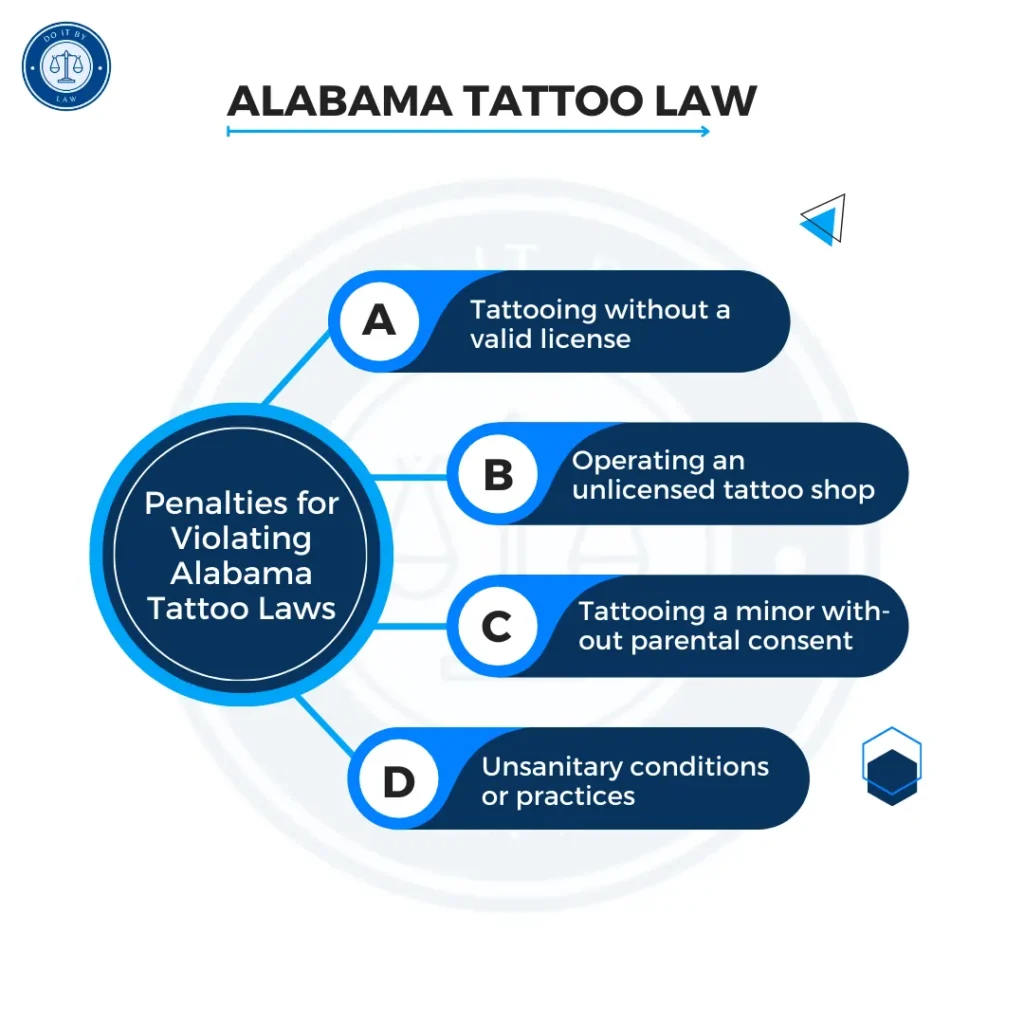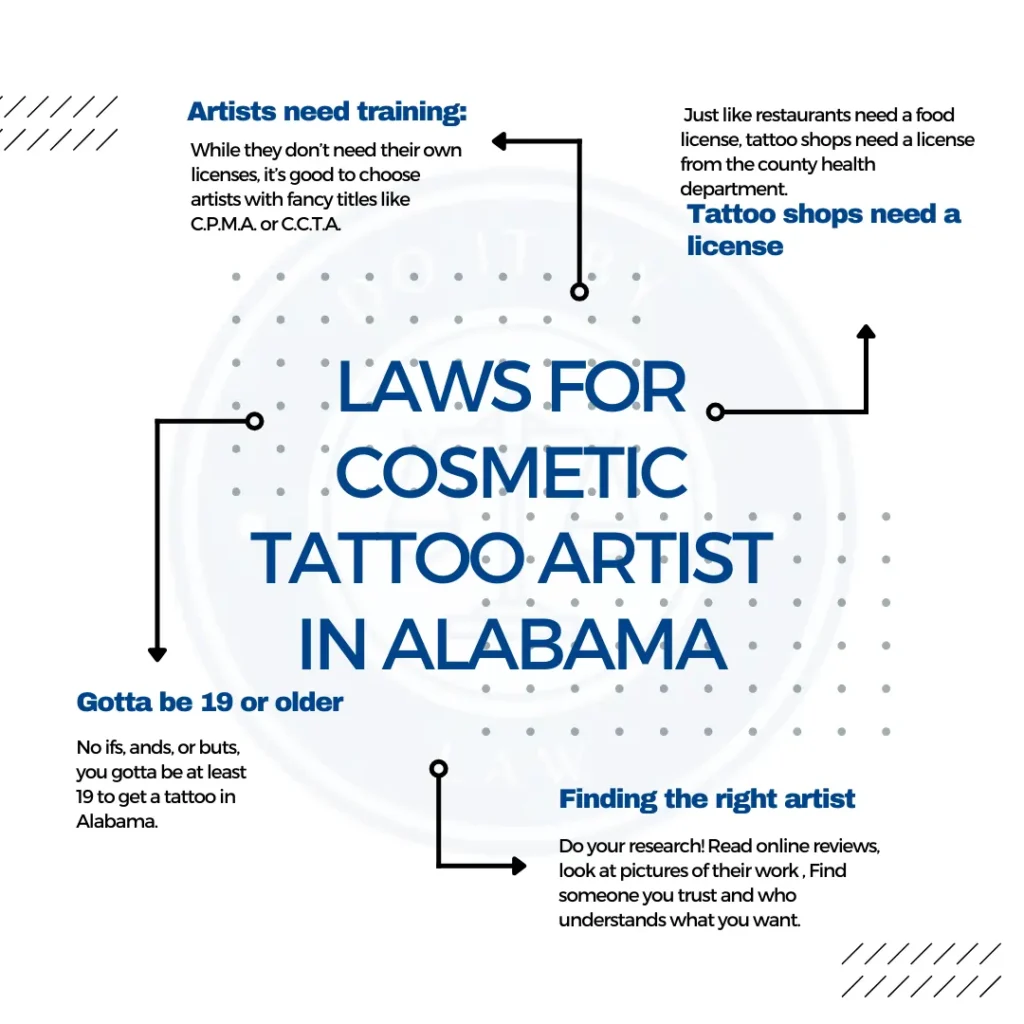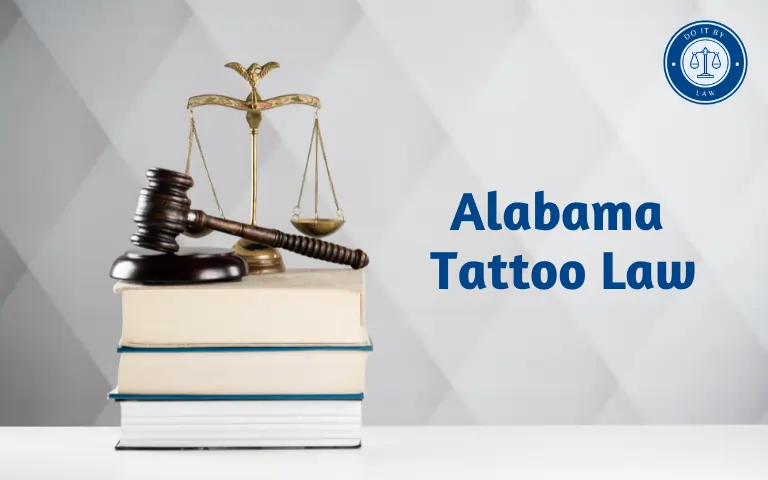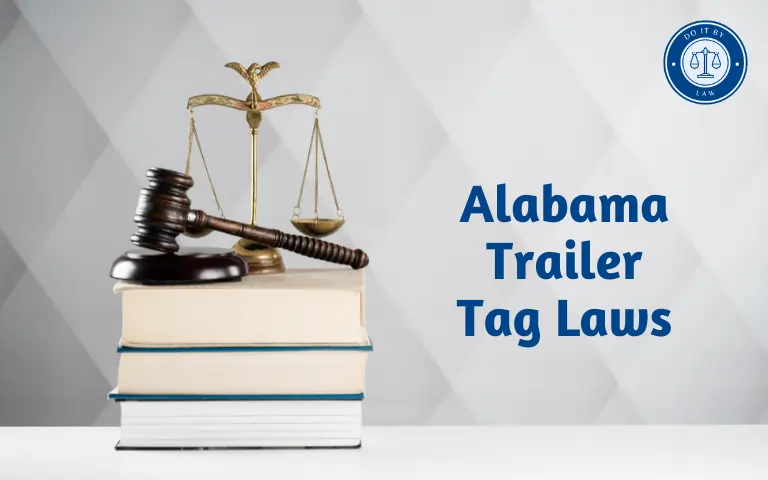Alabama Tattoo Law: What You Need to Know
Tattooing is a popular practice in Alabama but is regulated by specific laws on licensing, age restrictions, and health standards. Understanding the Alabama tattoo law is important for artists, clients, and shops. This article provides an overview of Alabama tattoo regulations, requirements, recent changes, and what to know.
Origins and Purpose of Alabama Tattoo Law
Alabama first enacted statewide legislation regulating the tattoo industry in 1961 under Act 1961-984. The tattoo laws in alabama established health and sanitation standards for tattoo facilities and license requirements for tattoo artists. The aim was to reduce health risks from unsanitary tattooing practices.
Updates in 2001 and 2010 expanded age restrictions and training mandates. Ongoing changes address new technologies and health concerns. The overall goal remains to protect public safety.
age restrictions for tattoos in Alabama
The minimum age have to be in alabama to get a tattoo is 19 years old. This applies to both males and females, and regardless of whether or not you have parental consent. Here’s a quick summary of the tattoo age in alabama laws:
Here are some more details on age restrictions for getting tattoos in Alabama:
- Alabama does not have a statewide minimum age law for tattoos. Instead, age requirements are set by county and city regulations.
- In counties and cities without local laws, tattoos are unregulated and parental consent is not required.
- Birmingham, Huntsville, Montgomery, and Mobile require parental consent for tattoos if under 18 years old.
- Some other cities and counties prohibit tattoos on minors under 18 without parents present, like Vestavia Hills, Homewood, and Baldwin County.
- A few places restrict tattoos on minors under 21 without parental approval, such as Fultondale and Pleasant Grove.
- Parents or legal guardians must be present at the tattoo studio and show valid ID establishing their relation to the minor to provide consent.
- Tattoo artists who apply tattoos to minors without following local parental consent regulations can face fines or loss of their business license.
- Permitting a minor to get a tattoo without following age restrictions can be prosecuted as a class C misdemeanor in some jurisdictions.
- Alabama does not make exceptions for emancipated minors or allow consent from other relatives besides parents/guardians.
It’s important to note that these are just the minimum age requirements. Some tattoo studios may have their own policies that set the minimum age higher than 19. It’s always best to call ahead and check with the studio before making an appointment.
Tattooing is prohibited on
- Body parts: Tattooing is prohibited on certain parts of minors’ bodies like the head, neck, hands, genitals
- Procedures: No nipple piercings, branding, scarification, suspension, subdermal implantation, microdermal implants, or tongue bifurcation allowed for minors
- Parental consent: Written, notarized consent from a parent or legal guardian is required for minors to get a tattoo or piercing
- Age limits: Some states have additional age restrictions for certain procedures, such as 16 for body piercings and 18 for tattoos on the face or hands
- Emancipated minors: Emancipated minors may be able to get a tattoo or piercing without parental consent, but they must provide proof of emancipation
Here are some additional things to keep in mind about getting a tattoo in Alabama:
- All tattoo studios must be licensed by the Alabama Department of Public Health.
- Tattoo artists must be at least 18 years old and must have completed a bloodborne pathogen training program.
- All tattoos must be done with sterile equipment.
- You will be asked to show a valid government-issued ID to prove your age before you get a tattoo.
Who Alabama Tattoo Law Applies To
Alabama’s tattoo law applies to various parties involved in the practice of tattooing and body piercing within the state:
1. Tattoo Facilities:
- This encompasses any establishment where tattooing or body piercing is performed.
- All such facilities must obtain a license from the Alabama Department of Public Health (ADPH) and adhere to their regulations.
- The license holder is responsible for ensuring compliance with safety and sanitation standards, recordkeeping requirements, and age restrictions.
2. Tattoo Artists:
- While artists themselves are not individually licensed, they must work in a licensed facility and follow all relevant regulations.
- This includes practicing universal precautions for hygiene and bloodborne pathogen prevention, maintaining proper equipment sanitation, and using only sterile needles.
- They also have a responsibility to check ID and obtain parental consent when required for clients under 19 years old.
3. Clients:
- The law applies to anyone seeking a tattoo or body piercing in Alabama.
- They are bound by the age restrictions: 18+ without parental consent, 19+ with it.
- Clients have the right to expect that the tattoo facility and artist they choose are licensed and follow safety protocols. They should feel free to ask questions and report any concerns to the ADPH if necessary.
So, anyone directly or indirectly involved in the tattooing and body piercing industry in Alabama is subject to its regulations. This ensures consistent practice across the state, prioritizing public health and safety while recognizing individual autonomy within legal boundaries.
If you have further questions about who the law applies to in specific situations, I recommend consulting the ADPH or seeking legal advice for detailed interpretations.
Key Provisions of Alabama Tattoo Law
The regulation of tattooing in Alabama falls under Chapter 17A of Title 22 of the Alabama Code, specifically focusing on Body Art Practices and Facilities. Here’s a summary of the key provisions:
Licensing and Permits:
- Tattoo facilities must obtain a license from the Alabama Department of Public Health (ADPH).
- The license must be displayed prominently within the facility.
- Tattoo artists are not individually licensed, but they must work in a licensed facility.
Age Restrictions:
- 18 years old and above: Individuals 18 years or older can get tattooed without parental consent.
- 19 years old with parental consent: Individuals under 19 years old require written, informed consent from a parent or legal guardian before getting tattooed. The consent must be obtained in the presence of the tattoo artist.
- Exceptions: Medical tattoos, such as those used for radiation therapy, have no age restrictions.
Health and Safety:
- Universal precautions: Tattoo artists must follow universal precautions to prevent the transmission of bloodborne pathogens. This includes wearing disposable gloves, using sterile needles, and properly disinfecting equipment.
- Waste disposal: Tattoo facilities must have a proper system for disposing of biohazardous waste.
- Recordkeeping: Facilities must maintain a record of each tattoo performed, including the client’s name, address, age, and signature, the date, design, and location of the tattoo, and the name of the artist.
Inspections and Enforcement:
- The ADPH has the authority to inspect tattoo facilities to ensure compliance with the law.
- Violations of the law can result in fines and/or jail time.
These provisions and others aim to maximize safety and prevent unsafe or irresponsible tattooing practices. Failing to adhere to standards can result in fines or loss of licensure.
Penalties for Violating Alabama Tattoo Laws
Violations of Alabama tattoo laws can result in various penalties, depending on the nature and severity of the offense. Here’s a breakdown:

Class C Misdemeanor:
- This is the most common penalty for violating the law. Fines of up to $100 and/or imprisonment for up to 90 days are possible for various offenses, including:
- Tattooing a minor without parental consent
- Operating an unlicensed tattoo facility
- Failing to follow hygiene and sanitation protocols
- Not properly disposing of biohazardous waste
- Tampering with inspection records
Administrative fines:
- The ADPH can impose additional administrative fines on a per-day basis for:
- Any violation of the law
- Non-compliance with a lawful order issued by the department
- Failing to comply with permit terms and conditions
- Closure of the facility: –In severe cases, the ADPH may order the temporary or permanent closure of a tattoo facility for persistent violations or egregious health risks.
- Potential civil liability: – Clients who suffer harm due to unsafe practices at a tattoo facility may file civil lawsuits against the facility, artist, or any responsible party. This could result in financial compensation for injuries, medical expenses, and other damages.
- Criminal charges: – In very rare circumstances, more serious criminal charges might be brought if a violation results in significant bodily harm or injury to clients.
It’s important to note that:
- Penalties are determined on a case-by-case basis by the ADPH and courts.
- Cooperation with corrective actions and demonstrating a commitment to compliance can often lead to reduced penalties.
- Consulting with an attorney can be helpful for individuals facing accusations of violations.
Repeated violations can result in higher fines or the tattoo artist or shop having their license suspended or revoked. Performing illegal tattooing may also constitute a criminal misdemeanor offense.
Recent Changes to Alabama Tattoo Law
Some notable updates to Alabama tattoo regulations in recent years include:
- 2010 – Stricter rules prohibiting tattooing of minors under 14, even with parental approval.
- 2010 – Mandatory bloodborne pathogen control training for artists.
- 2001 – Established fine structure for violations.
- 2001 – Required licensing and inspections for permanent makeup application.
- 2001 – Set rules on tattooing minors aged 14-18 with parental consent.
The evolving law keeps pace with new practices as the tattoo industry grows. The focus remains on health protection.
While there haven’t been any major legislative changes to Alabama’s tattoo law in recent years (since 2024), there have been some developments and updates worth mentioning:
1. Updated Regulations:
- July 2019: The Alabama Department of Public Health (ADPH) adopted updates to their Body Art Rules (Chapter 420-3-23). These clarify existing language and address specific procedures like scarification and microblading.
2. Increased Enforcement:
- The ADPH has been focusing on increased enforcement of the existing tattoo law through:
- Enhanced inspections: Conducting more routine and unannounced inspections of tattoo facilities.
- Public education: Disseminating information about the law and safety practices to consumers and the industry.
- Collaborative efforts: Working with local law enforcement to address violations.
3. Ongoing Discussions:
- There are ongoing discussions and proposals regarding potential further amendments to the law, such as:
- Mandatory bloodborne pathogen training for tattoo artists.
- ** stricter age restrictions for certain types of tattoos.**
- Additional regulations for body modification practices beyond tattooing and piercing.
4. Legal Precedents:
- As legal cases related to tattooing emerge, court decisions can interpret and clarify specific aspects of the law. These precedents can then influence future enforcement and potential amendments.
While there might not be dramatic legislative changes yet, these developments demonstrate a continued focus on ensuring safe and ethical practices within Alabama’s tattoo industry. Stay updated by referring to the ADPH website and relevant legal resources for any official changes or rulings.
Controversies and Challenges Around Alabama Tattoo Law
Alabama tattoo law has seen some controversies arise:
- License costs – Some argue the license fees of $150-$250 annually for artists and shops are excessive and a barrier to entering the industry.
- Age limits too strict – Critics believe prohibiting tattoos for minors under 14 is overly strict, preventing parents from making decisions for their own children.
- Uneven enforcement – There are complaints of uneven enforcement, with some shops receiving harsher scrutiny than others over minor infractions.
- Regulation overreach – Some conservatives argue tattooing should not be subject to extensive governmental regulation as a matter of personal liberty.
- Training requirements – Mandatory bloodborne pathogen training is controversial due to the cost burden on artists.
As attitudes around tattoos evolve, debates over Alabama’s law will likely continue. But health and safety concerns remain a priority. The tattoo industry has a strong influence over any changes.
Alabama Law on Permanent Makeup
In alabama permanent makeup falls under the category of body art, so it’s good you’re asking about it! Here’s what you need to know:
Legality and Regulations:
- Licensing: Permanent makeup artists must be associated with a facility that holds a body art license issued by the county health department. The artist themselves doesn’t necessarily need a separate license.
- Regulations: Similar to tattoos, alabama permanent makeup procedures must follow hygiene and safety standards outlined by the Alabama Department of Public Health.
Finding a Qualified Artist:
- Look for certified artists: Look for artists with certifications like Certified Permanent Makeup Artist (C.P.M.A.) or Certified Cosmetic Tattoo Artist (C.C.T.A.).
- Check reviews and portfolios: Read online reviews and ask for before-and-after photos to see the artist’s style and skill level.
- Consult with a doctor: If you have any medical conditions, consult your doctor before undergoing a alabama permanent makeup procedure.
Laws for Cosmetic Tattoo Artist in Alabama
Cosmetic tattoo artist alabama falls under the umbrella of “body art,” so the laws and regulations governing it are the same as those for traditional tattooing. Here’s a breakdown of the key points:

- Tattoo shops need a license: Just like restaurants need a food license, tattoo shops need a license from the county health department. This makes sure things are clean and safe.
- Artists need training: While they don’t need their own licenses, it’s good to choose artists with fancy titles like C.P.M.A. or C.C.T.A. These mean they’ve learned lots about doing cool stuff like eyebrows and eyeliner tattoos.
- Rules to keep you safe: Think of these like the rules of the playground. Tattoo shops gotta use clean tools, throw away used stuff the right way, and talk to you before they tattoo anything.
- Gotta be 19 or older: No ifs, ands, or buts, you gotta be at least 19 to get a tattoo in Alabama. Even your parents can’t sign you up if you’re younger.
- Some things are off-limits: Scarring and branding tattoos are a no-no in Alabama. They can hurt and aren’t cool.
- Finding the right artist: Do your research! Read online reviews, look at pictures of their work, and don’t be afraid to ask questions. Find someone you trust and who understands what you want.
- Eyebrows, eyeliner, lips, and more: Alabama offers lots of cool options like microblading for perfect brows, eyeliner that never smudges, and even permanent lip color!
Remember: This is a big decision, so take your time and choose wisely. With the right info and a little detective work, you can find a qualified artist and get the beautiful, safe, and legal cosmetic tattoos you’ve been dreaming of!
How to Legally Open a Tattoo Shop in Alabama
Careful planning and attention to Alabama’s tattoo laws ensure a legal, safe shop. Renew and display required licenses prominently. Opening a licensed, compliant tattoo shop in Alabama involves the following key steps:
- Step 1: Check Alabama Tattoo Shop Regulations: – Review the health department’s rules on tattoo facility standards for safety, sanitation, equipment, etc. Also, learn licensing steps.
- Step 2: Secure a Suitable Commercial Location: – Find a space suitably zoned for a tattoo business that can meet all facility and layout requirements.
- Step 3: Obtain a Business License: – Apply for an Alabama state business license as well as required local licenses to legally operate a business.
- Step 4: Arrange Necessary Shop Inspections: – Schedule inspections by the health department, fire department, and building code officials to ensure compliance.
- Step 5: Obtain an Alabama Tattoo Shop License: – Submit a tattoo shop license application, pay the fee, and meet the requirements to receive a facility license from the state health department.
- Step 6: Hire Licensed Tattoo Artists: Hire only tattooers holding current, valid Alabama tattoo licenses. Verify their license status.
- Step 7: Implement Mandated Records System: -Maintain confidential client records on tattoos performed, consent forms, etc. per state regulations.
- Step 8: Follow Ongoing Compliance Standards: – Get periodic inspections. Properly sterilize equipment, maintain safety protocols, and update licenses annually.
Key Takeaways on Alabama Tattoo Law
In summary, some main points about Alabama tattoo regulations include:
- Tattoo artists must complete training and obtain a state license.
- Shops must pass inspections and meet health standards to gain licensure.
- Parental consent is required for minors under 18.
- Violations can result in fines of up to $1,500.
- The law prohibits certain tattoo placements on minors.
- Artists cannot tattoo impaired persons.
Always consult official state and local authorities for the latest tattoo laws and requirements in Alabama. Staying current on regulations is essential for legal, safe, and ethical tattoo services.
Frequently Asked Questions
Alabama Tattoo Law Resources
- Alabama Tattoo Shop and Artist Licensing: Application Info
- Alabama Tattooing Minor Consent Form: Sample Template
- ALA. Code Section 22-17A: Alabama Tattoo Regulation
- Alabama Tattoo Shop Regulations: Health Dept. Rules







